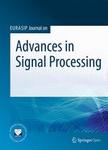版权所有:内蒙古大学图书馆 技术提供:维普资讯• 智图
内蒙古自治区呼和浩特市赛罕区大学西街235号 邮编: 010021

作者机构:Univ Macau Dept Elect & Comp Engn Fac Sci & Technol Ave Univ Taipa Macau Peoples R China Univ Macau Dept Math Fac Sci & Technol Ave Univ Taipa Macau Peoples R China
出 版 物:《EURASIP JOURNAL ON ADVANCES IN SIGNAL PROCESSING》 (Eurasip. J. Adv. Sign. Process.)
年 卷 期:2018年第2018卷第1期
页 面:1页
核心收录:
基 金:Macau Science and Technology Development Fund (FDCT) [036/2009/A, 142/2014/SB, 055/2015/A2, 079/2016/A2] University of Macau Research Committee under MYRG [069(Y1-L2)-FST13-WF, 2014-00174-FST, 2016-00240-FST, 2016-00053-FST, 2017-00207-FST]
主 题:Adaptive Fourier decomposition Unscented Kalman filter Nelder-Mead algorithm Genetic algorithm Particle swarm optimization algorithm
摘 要:The adaptive Fourier decomposition (AFD) uses an adaptive basis instead of a fixed basis in the rational analytic function and thus achieves a fast energy convergence rate. At each decomposition level, an important step is to determine a new basis element from a dictionary to maximize the extracted energy. The existing basis searching method, however, is only the exhaustive searching method that is rather inefficient. This paper proposes four methods to accelerate the AFD algorithm based on four typical optimization techniques including the unscented Kalman filter (UKF) method, the Nelder-Mead (NM) algorithm, the genetic algorithm (GA), and the particle swarm optimization (PSO) algorithm. In the simulation of decomposing four representative signals and real ECG signals, compared with the existing exhaustive search method, the proposed schemes can achieve much higher computation speed with a fast energy convergence, that is, in particular, to make the AFD possible for real-time applications.